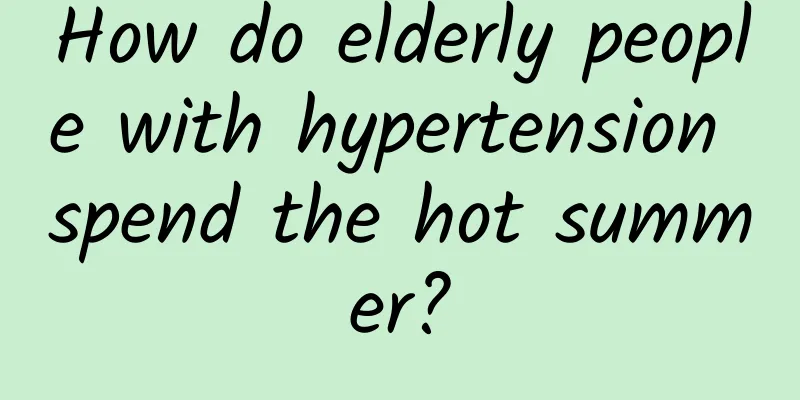How do elderly people with hypertension spend the hot summer?

|
For most elderly people with hypertension, summer is a difficult season. Not only does the hot weather and low air pressure cause poor sleep and irritability, but many patients also experience unstable blood pressure, chest tightness and discomfort, and may even develop more serious cardiovascular diseases. Hypertensive patients should pay attention to the following issues during hot weather: Drink water appropriately. Drink water regularly and pay attention to replenishing water. Even if you don't feel too hot, you should drink water appropriately. Place a water cup by the bed at night so that you can drink water appropriately when you wake up in the middle of the night. Exercise moderately. Appropriate exercise can improve the regulation of nerves and blood vessels and effectively lower blood pressure. Avoid excessive sweating and excessive activities, because excessive sweating and excessive breathing may cause water loss and easily lead to cardiovascular and cerebrovascular emergencies. Pay attention to your diet. Adhere to dietary treatment. In summer, your appetite may decrease. You should pay attention to the combination of meat and vegetables, maintain a diet low in animal fat and rich in vitamins and fiber, and increase the intake of potassium-rich foods (fresh vegetables, fruits, and beans). Keep a regular schedule. Live a regular life, quit smoking and drinking, and prevent excessive fatigue. Go to bed early and don't stay up late. Take a proper lunch break to make up for the lack of sleep and ensure normal sleep. In the hot summer, you must pay attention to properly adjust the indoor temperature. The room temperature should be kept at 27℃~28℃. It is recommended to ventilate the room frequently and breathe fresh air. Keep your emotions calm. Tension, irritability, and emotional instability can all increase blood pressure. Patients can try to change their behavior, stay calm and composed, avoid emotional agitation, excessive tension, and anxiety. Develop hobbies and interests to live in the best and most comfortable environment. Take medication properly. In the summer, some elderly patients who are often worried about their blood pressure will reduce or even stop taking their medication without authorization when they find that their blood pressure has dropped before they take their antihypertensive medication. On the contrary, some patients will immediately increase their medication when they find that their blood pressure has risen. These practices are not advisable. It is necessary to increase or decrease medication properly and appropriately under the guidance of a doctor to avoid the occurrence of serious cardiovascular and cerebrovascular diseases. |
<<: Catch it all: Review of new advances in the treatment of chronic kidney disease
>>: Can the third-generation antidepressants under development save us?
Recommend
Causes of bleeding during intercourse after IUD insertion
With the advancement of our science and technolog...
Tips on preventing sports injuries amid the general fitness craze
Author: Chen Mingzhi, The First Affiliated Hospit...
Why do women feel nausea and bloating?
It is quite common for women to experience nausea...
Vertigo caused by the ears? You will understand after reading these
Vertigo is a disease that many people suffer from...
What is a bland diet? Many people have these three dangerous eating habits...
As the saying goes, "Man is iron and rice is...
A must-read for college entrance exam candidates. Don’t be blinded by propaganda such as “brain tonic” and “brain fitness”…
Approaching the middle and high school entrance e...
How to use extra virgin olive oil? Is olive oil a vegetable oil?
Olive oil is considered to be the most suitable o...
Does your child keep blinking? Beware of abnormal blinking in children!
Author: Chen Tingliang Shenzhen Children's Ho...
Traditional Chinese medicine for nourishing the stomach, old Chinese medicine teaches you how to nourish the stomach
The stomach is the main organ for the human body ...
Can I take licorice tablets when I have a cough during breastfeeding?
Licorice tablets are a relatively common Chinese ...
Apple: Data shows that iOS 16 penetration rate exceeds 80%, iPadOS 16 exceeds 70%
Recently, according to foreign media reports, as ...
Are the uterus and ovaries the same thing?
We all know that in order for a woman to get preg...
Can I use iodine while breastfeeding?
Breastfeeding is a very special period. There are...
How to quickly enlarge breasts after weaning? This is the trick!
I believe that breast shrinkage is unbearable for...
Cervical intraepithelial neoplasia grade II
Grade 3 cervical intraepithelial neoplasia takes ...









